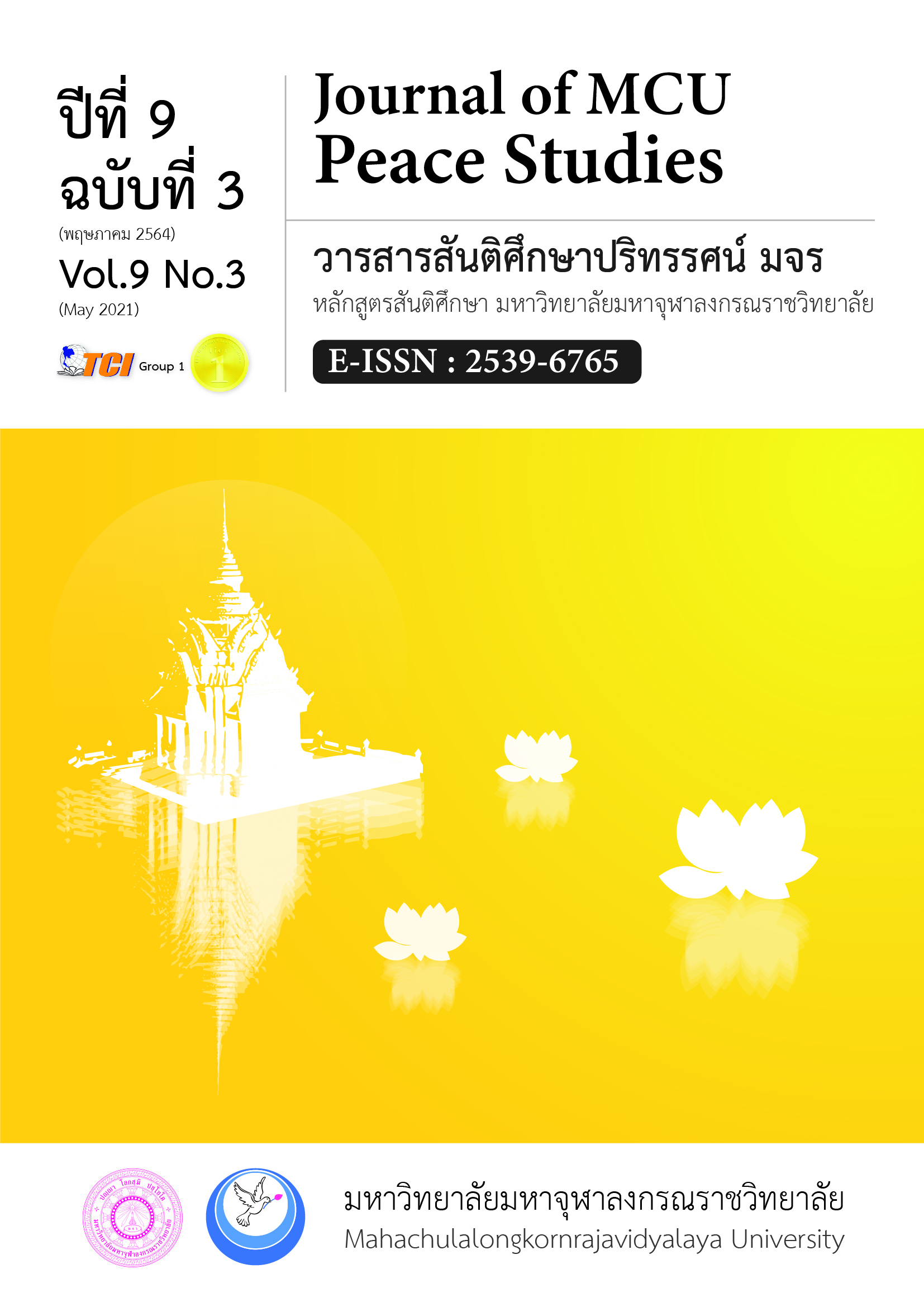Peacebuilding Strategy to Support the Elderly Society: A Case Study of Sawai Subdistrict, Prang Ku District Sisaket Province
Main Article Content
Abstract
The research article consists of three objectives: 1) to study the strategy and community’s context of the aging society of Sawai subdistrict as well as the peaceful well-being enhancement according to the policy of the government and modern sciences; 2) to study the principles and methods for enhancing the peaceful well-being for the elderly according to Theravada Buddhism; and 3) to develop and propose the strategy on enhancing peaceful well-being based on the Buddhist integration for the elderly of Sawai subdistrict, Prang Ku district, Sisaket province. The study is qualitative research by a field study and focus group discussion with key informants acquired by means of purposive sampling. The acquired data were descriptively analyzed. The results of the research are as follows: 1) From studying strategy, context of the aging society, and peacebuilding according to the government policy and modern science, the following four strategies are found: 1st strategy on the development of physical body for health rehabilitation; 2nd strategy on the development of environment and livelihood; 3rd strategy on the development of behavior and recreation; and 4th strategy on the development of mental health. 2) From studying the principles and methods for enhancing the peaceful well-being for the elderly according to Theravada Buddhism, Trisikkhā (the Threefold training) is found as follows: Sīla (morality) refers to the stable practice according to law, morality, ethics, customs; Samādhi (concentration) refers to stability, determination, and learning to let go; Paññā (wisdom) refers to having awareness, knowledge and understanding sustainably. From studying Trisikkhā, it results in philosophy on “being strong according to the age, having a strong mind and a joyful wisdom”.3) After integrating the four aspects of strategy with Trisikkhā, the following results are found: 1st aspect on health; 2nd aspect on sustainability; 3rd on stability; and 4th aspect on happiness, by which of these four aspects are under the “Happiness Goals”.
Article Details
Views and opinions expressed in the articles published by The Journal of MCU Peace Studies, are of responsibility by such authors but not the editors and do not necessarily reflect those of the editors.
References
Boonruang, P. (2006). Sustainable Human Resource Development in accordance with Buddhism. (Master’s Thesis). Department of Social Sciences for Development. Rajabhat Chiang Rai University. Chiang Rai.
Department of Older Persons Ministry of Social Development and Human Security. (2019). Measures to drive the national agenda on the aging society (Revised version). (2th ed.). Bangkok: Amarin Printing and Publishing Public Company Limited.
Government Gazette. (2018). National Strategy (B.E. 2018-2037). Retrieved May 3, 2019, from http://www.ratchakitcha.soc.go.th/DATA/PDF/2561/A/082/T_0001.PDF
Katekinta, K. (1998). The Elderlys Qualily of Life in Home for the Aged in Bangkok. (Master’s Thesis). Kasetsart University. Bangkok.
Kijboonchu, L. (2002). Aging and the status and roles of the elderly in the Songkhla community Case Study of Ban Noen Wa, Kong Subdistrict, Kong Krailas District Sukhothai Province. (Master’s Thesis). Silpakorn University. Bangkok.
Mahachulalongkornrajavidyalaya University. (1996). Thai Tripitakas. Bangkok: MCU Press.
Pheatrasuwan, S. (1999). Health Needs of the Elderly: A Case Study of Rayong Province. (Master’s Thesis). Population Studies. Mahidol University. Bangkok.
Phrabrahmagunabhorn, (P.A. Piyutto). (2006). Buddhist holistic well-being. (5th ed). Bangkok: Dharma in Trend.
Phradhammapitaka, (P.A. Payutto). (2003). Suffering for seeing but happiness for being (Essence of Buddhism). (9th ed.). Bangkok: Thammasarn Co., Ltd.
Phradharmmasinghaburachan, (Charan Thitthamo). (2004). Life Security Every breath takes advantage of time. Bangkok: Banluetham Institute, Nopparatham.
Pruittipinyo, C., & Sirichotiratana, N. (2015). Law and Policy Review on the Elderly into health management. Journal of Health Law and Public Health, 1(2), 119-134.
San-sanguan, S. (2010). Policy on Aging Society: Lessons from Japan and Korea. Journal of Japanese Studies, 26(2), 55-70.
Somdetphrabuddhakosajarn, (P.A. Payutto). (2017). If to be the elderly Should be an elderly person. Nakhon Pathom: Wat Yan Time of the Day of the Praise Somdet Phra Phutthakosachan (P.A. Payutto) is the National Elder.
Thanadirek, R. (2020). The National Committee on Older Persons. Bangkok: Office of the Prime Minister.


